第十章 第一节动词的时态 课件(共35张PPT) 2024年中考英语二轮专题复习(广东专版)
文档属性
| 名称 | 第十章 第一节动词的时态 课件(共35张PPT) 2024年中考英语二轮专题复习(广东专版) | 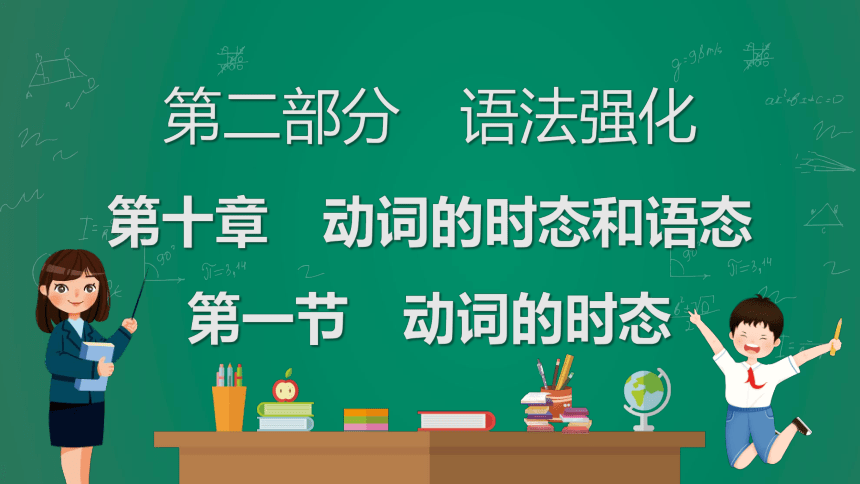 | |
| 格式 | pptx | ||
| 文件大小 | 6.0MB | ||
| 资源类型 | 教案 | ||
| 版本资源 | 通用版 | ||
| 科目 | 英语 | ||
| 更新时间 | 2024-06-02 18:32:53 | ||
图片预览

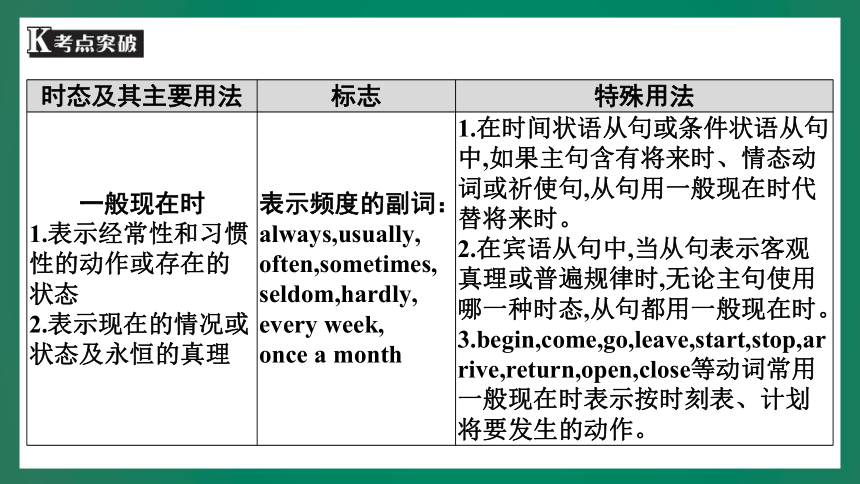
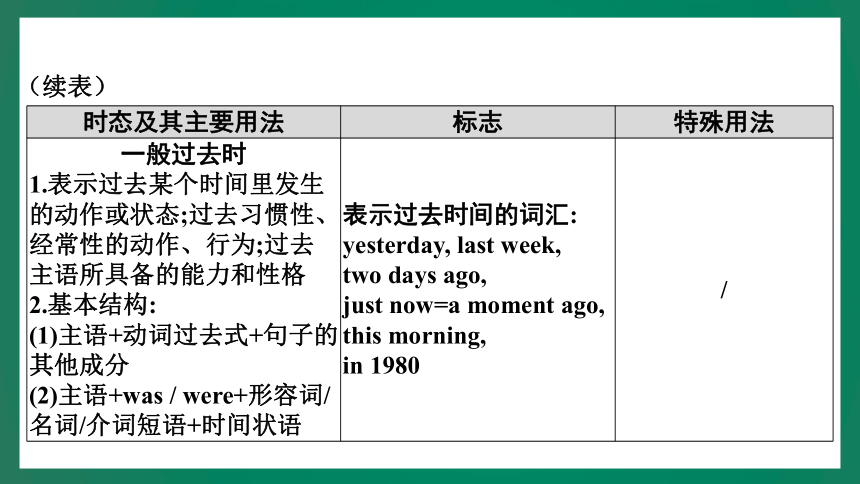
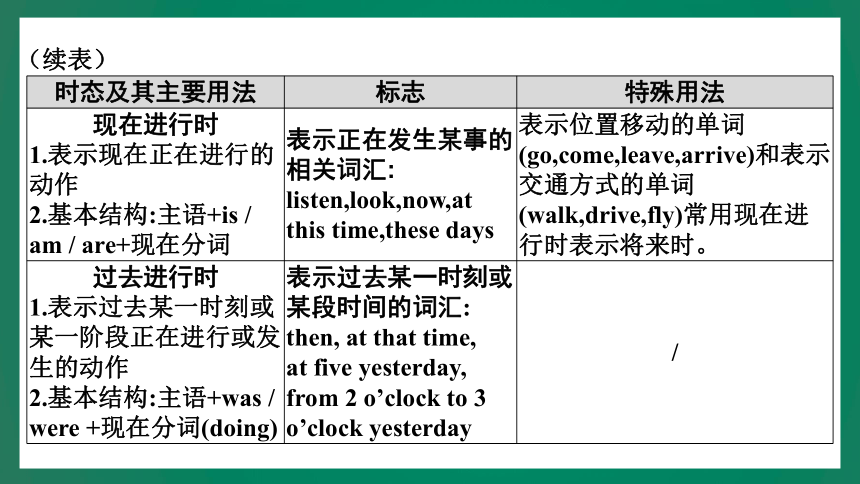
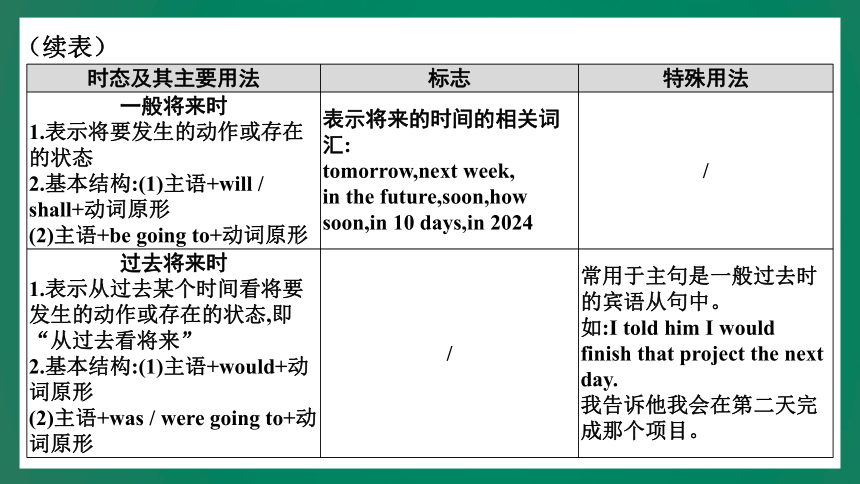
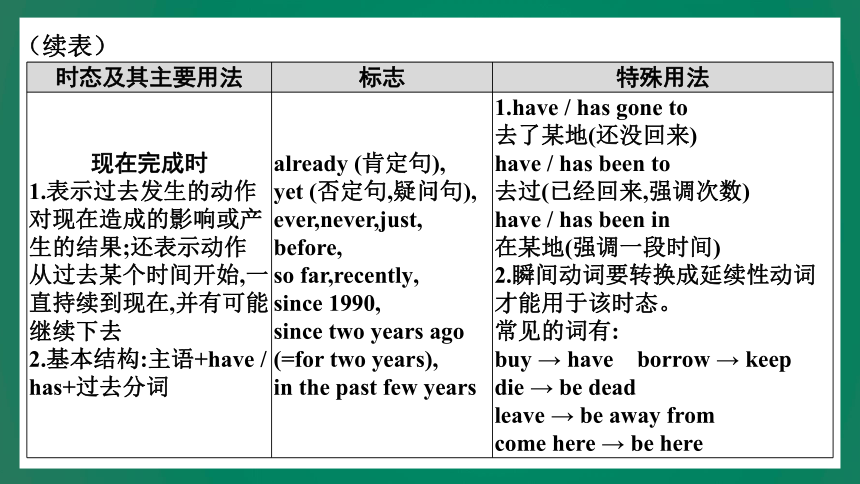
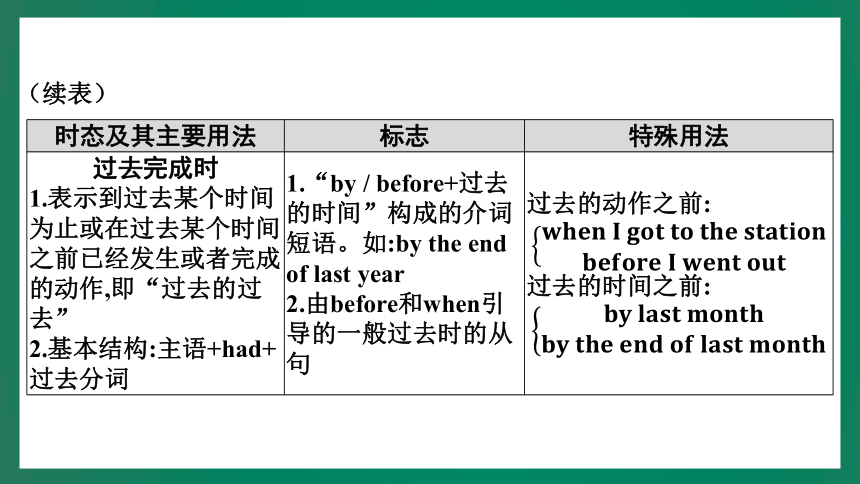
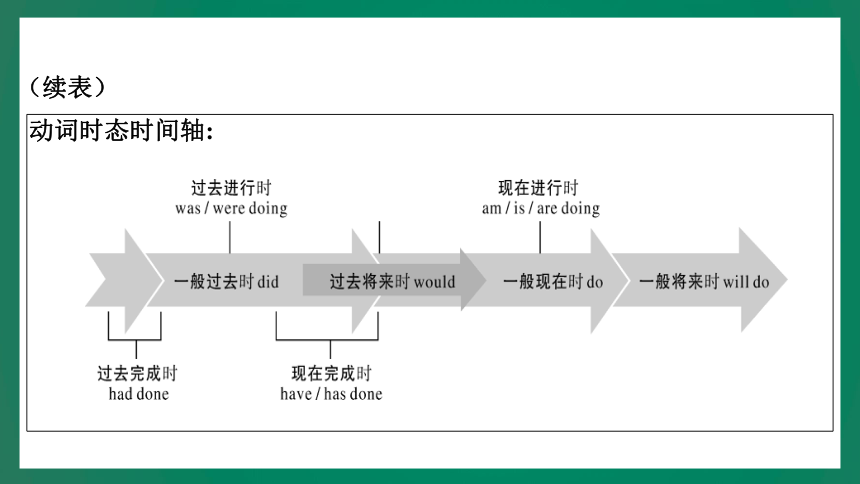
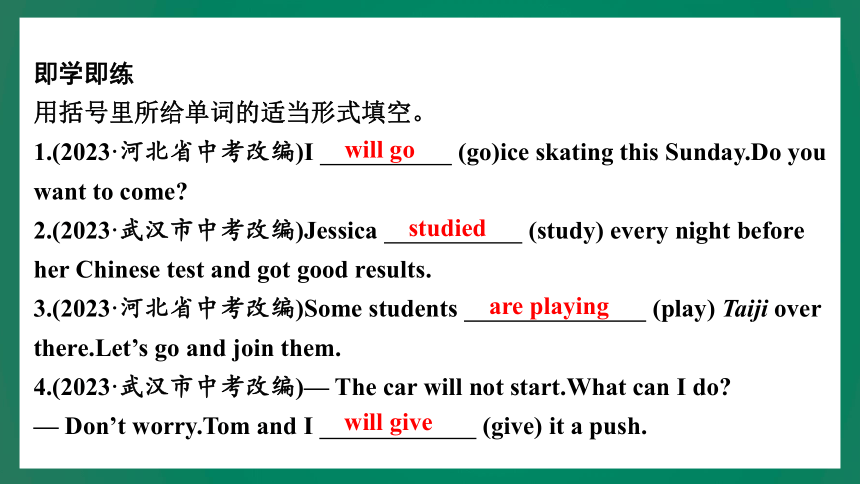
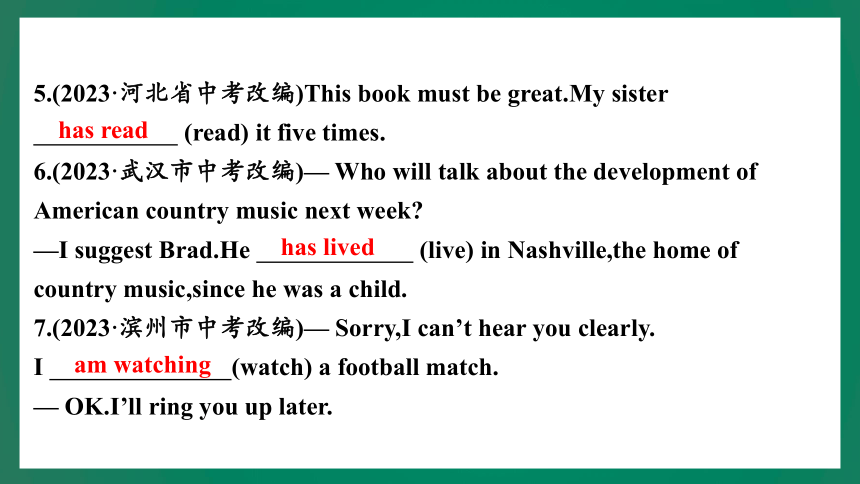
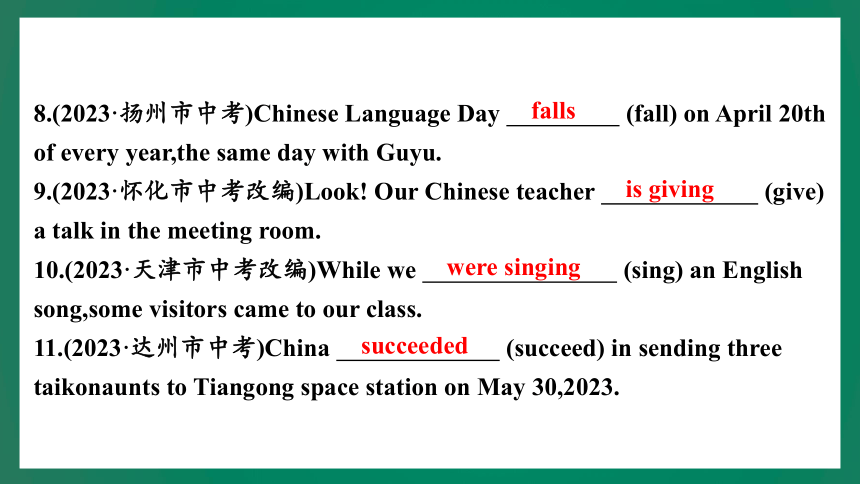
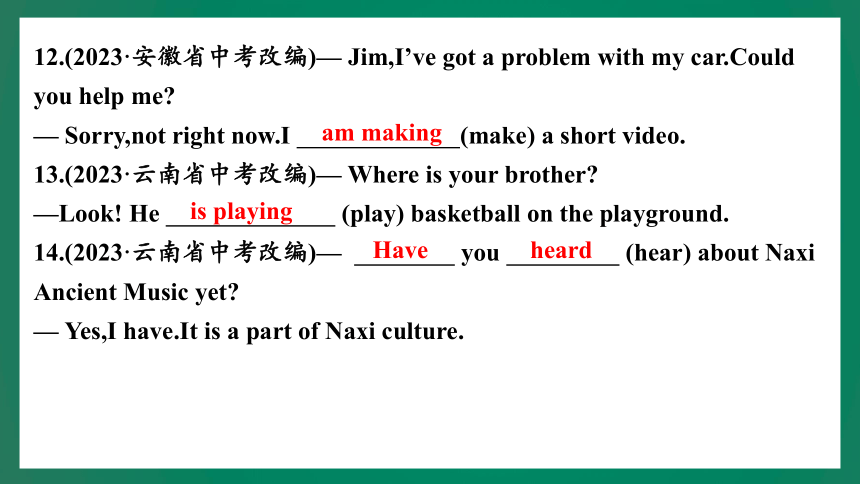
文档简介
(共35张PPT)
第十章 动词的时态和语态
第一节 动词的时态
第二部分 语法强化
时态及其主要用法 标志 特殊用法
一般现在时 1.表示经常性和习惯性的动作或存在的状态 2.表示现在的情况或状态及永恒的真理 表示频度的副词: always,usually, often,sometimes, seldom,hardly, every week, once a month 1.在时间状语从句或条件状语从句中,如果主句含有将来时、情态动词或祈使句,从句用一般现在时代替将来时。
2.在宾语从句中,当从句表示客观真理或普遍规律时,无论主句使用哪一种时态,从句都用一般现在时。
3.begin,come,go,leave,start,stop,arrive,return,open,close等动词常用一般现在时表示按时刻表、计划将要发生的动作。
(续表)
时态及其主要用法 标志 特殊用法
一般过去时 1.表示过去某个时间里发生的动作或状态;过去习惯性、经常性的动作、行为;过去主语所具备的能力和性格 2.基本结构: (1)主语+动词过去式+句子的其他成分 (2)主语+was / were+形容词/名词/介词短语+时间状语 表示过去时间的词汇: yesterday, last week, two days ago, just now=a moment ago, this morning, in 1980 /
(续表)
时态及其主要用法 标志 特殊用法
现在进行时 1.表示现在正在进行的动作 2.基本结构:主语+is / am / are+现在分词 表示正在发生某事的相关词汇: listen,look,now,at this time,these days 表示位置移动的单词(go,come,leave,arrive)和表示交通方式的单词(walk,drive,fly)常用现在进行时表示将来时。
过去进行时 1.表示过去某一时刻或某一阶段正在进行或发生的动作 2.基本结构:主语+was / were +现在分词(doing) 表示过去某一时刻或某段时间的词汇: then, at that time, at five yesterday, from 2 o’clock to 3 o’clock yesterday /
(续表)
时态及其主要用法 标志 特殊用法
一般将来时 1.表示将要发生的动作或存在的状态 2.基本结构:(1)主语+will / shall+动词原形 (2)主语+be going to+动词原形 表示将来的时间的相关词汇: tomorrow,next week, in the future,soon,how soon,in 10 days,in 2024 /
过去将来时 1.表示从过去某个时间看将要发生的动作或存在的状态,即“从过去看将来” 2.基本结构:(1)主语+would+动词原形 (2)主语+was / were going to+动词原形 / 常用于主句是一般过去时的宾语从句中。
如:I told him I would finish that project the next day.
我告诉他我会在第二天完成那个项目。
(续表)
时态及其主要用法 标志 特殊用法
现在完成时 1.表示过去发生的动作对现在造成的影响或产生的结果;还表示动作从过去某个时间开始,一直持续到现在,并有可能继续下去 2.基本结构:主语+have / has+过去分词 already (肯定句), yet (否定句,疑问句), ever,never,just, before, so far,recently, since 1990, since two years ago (=for two years), in the past few years 1.have / has gone to
去了某地(还没回来)
have / has been to
去过(已经回来,强调次数)
have / has been in
在某地(强调一段时间)
2.瞬间动词要转换成延续性动词才能用于该时态。
常见的词有:
buy → have borrow → keep
die → be dead
leave → be away from
come here → be here
(续表)
时态及其主要用法 标志 特殊用法
过去完成时 1.表示到过去某个时间为止或在过去某个时间之前已经发生或者完成的动作,即“过去的过去” 2.基本结构:主语+had+过去分词 1.“by / before+过去的时间”构成的介词短语。如:by the end of last year 2.由before和when引导的一般过去时的从句 过去的动作之前:
过去的时间之前:
(续表)
动词时态时间轴:
即学即练
用括号里所给单词的适当形式填空。
1.(2023·河北省中考改编)I (go)ice skating this Sunday.Do you want to come
2.(2023·武汉市中考改编)Jessica (study) every night before her Chinese test and got good results.
3.(2023·河北省中考改编)Some students (play) Taiji over there.Let’s go and join them.
4.(2023·武汉市中考改编)— The car will not start.What can I do
— Don’t worry.Tom and I (give) it a push.
will give
are playing
studied
will go
5.(2023·河北省中考改编)This book must be great.My sister
(read) it five times.
6.(2023·武汉市中考改编)— Who will talk about the development of American country music next week
—I suggest Brad.He (live) in Nashville,the home of country music,since he was a child.
7.(2023·滨州市中考改编)— Sorry,I can’t hear you clearly.
I (watch) a football match.
— OK.I’ll ring you up later.
am watching
has lived
has read
8.(2023·扬州市中考)Chinese Language Day (fall) on April 20th of every year,the same day with Guyu.
9.(2023·怀化市中考改编)Look! Our Chinese teacher (give) a talk in the meeting room.
10.(2023·天津市中考改编)While we (sing) an English song,some visitors came to our class.
11.(2023·达州市中考)China (succeed) in sending three taikonaunts to Tiangong space station on May 30,2023.
succeeded
were singing
is giving
falls
12.(2023·安徽省中考改编)— Jim,I’ve got a problem with my car.Could you help me
— Sorry,not right now.I (make) a short video.
13.(2023·云南省中考改编)— Where is your brother
—Look! He (play) basketball on the playground.
14.(2023·云南省中考改编)— you (hear) about Naxi Ancient Music yet
— Yes,I have.It is a part of Naxi culture.
heard
Have
is playing
am making
15.(2023·成都市中考改编)I am sorry I didn’t answer your phone because I (play) the piano at that time.
16.(2023·自贡市中考改编)— Why didn’t you pick up my phone at seven o’clock last night
— I (do) the dishes in the kitchen at that time so I didn’t hear it.
17.(2023·天水市中考)I (learn) English ever since I was in Grade 3.
18.(2023·永州市中考) A journey of a thousand li (begin)with a single step.
19.(2023·永州市中考)Last week my sister (fail) her cooking exam because she burnt something.
failed
begins
have learned / have learnt
was doing
was playing
1.一般直接在动词后面加-s。
如:look — looks like — likes
2.以s,x,ch,sh 结尾的单词后面加-es。
如:brush — brushes watch — watches
3.以辅音字母加y结尾的单词,变y为i 再加-es。
如:fly — flies carry — carries
4.不规则变化。
如:have — has
即学即练
用括号里所给单词的适当形式填空。
1.Tom (go) to school by bike every day.
2.They (go) to school on foot.
3.She often (fly) kites on the weekend.
4.I usually (wash) my clothes in the morning.
5. he always (play) football on Friday evening
6.His sister (not have) piano lessons on Sundays.
doesn’t have
play
Does
wash
flies
go
goes
1.动词过去式的变化规则:
(1)一般直接在动词后面加-ed。如:want — wanted look — looked
(2)以e结尾的在动词后面直接加-d。如:like — liked
(3)以一个辅音字母结尾的重读闭音节单词,双写最后一个字母再加-ed。如:stop — stopped
(4)以辅音字母加y结尾的变y为i加-ed。 如:carry — carried
2.几种需要使用动词过去式的情况和本身含有过去式意义的情况:
(1)used to do sth.表示过去经常但现在已不再维持的习惯或动作。
如:The kings used to live in the castle. 国王过去常常住在城堡里。
注意:be / become / get used to+doing 习惯于做……
如:My grandpa is used to living in the countryside. 我爷爷习惯于住在乡下。
(2)“It is+一段时间+since+一般过去时”表示“自从……以来有……时间”的意思,主句可用It is来代替It has been。
如:It is 10 years since I came to Shenzhen. 自我来到深圳,已经有10年了。
即学即练
用括号里所给单词的适当形式填空或按要求完成句子。
1.Jenny (not go) to bed until 11:00 o’clock last night.
2.I (see) Li Lei (go) out just now.
3.They (buy) a guitar yesterday.
4.Tom (clean) the classroom yesterday.
5.I (use) to do exercise in the gym.
6.— Sarah (watch) TV last night
— .(肯定回答)
7.— John (go) swimming last week
— .(否定回答)
No,he didn’t
go
Did
Yes,she did
watch
Did
used
cleaned
bought
go
saw
didn’t go
1.一般直接在动词后面加-ing。
如:do — doing ski — skiing
2.以不发音e结尾的单词,去掉e 再加-ing。
如:write — writing ride — riding
3.以一个辅音字母结尾的重读闭音节单词,双写最后一个字母再加-ing。
如:shop — shopping swim — swimming
即学即练
用括号里所给单词的适当形式填空,或按要求完成句子。
1.He (do) his homework now.
2.He (not do) his homework now.
3.— he (do) his homework now
— .(肯定回答)
4.Look! They are (draw) under a big tree.
5.— Can you help me water the flowers,David
— Sorry,Mum.I am (help) Dad wash the car.
helping
drawing
Yes,he is
doing
Is
isn’t doing
is doing
1.“祈使句+and / or+句子”结构中后面的句子中的谓语动词可用一般将来时。
如:Hurry up,or you will miss the bus.快点吧,不然你会错过这趟公共汽车的。
注意:以动词原形开头的祈使句省略的主语通常是you,所以其反义疑问句部分常用will you 补充。如果该祈使句以let’s 开头,那么反义疑问句部分用shall we。
2.“be going to+动词原形”表示打算做某事或可能要发生某事。
即学即练
一、完成句子。
1.开动你的大脑,你将会找到办法。
Use your brain,and you a way.
2.车不要开那么快,否则你会有车祸的。
Don’t drive so fast or you an accident!
3.我们学校将有场运动会。
There a sports meeting in our school.
4.Open the window,
5.Let’s go to the zoo,
shall we
will you
is going to be / will be
will have
will find
二、用括号里所给动词的适当形式填空,或按要求完成句子。
1.He (make) a card for his mom this weekend.
2.He (not make) a card for his mom this weekend.
3.— he (make) a card for his mom this weekend
— .(肯定回答)
Yes,he will
make
Will
will not / won’t make
will make
1.现在完成时表示过去发生的某一动作对现在造成的影响或结果,或表示过去所发生的动作或存在的状态一直持续到现在并可能还将持续下去。
2.have gone to,have been to和have been in的区别在于:have gone to表示“去了某地”(人在该地),have been to表示“去过某地”(人已回来),have been in表示“待在某地”(人一直在该地)。
3.现在完成时可与表示“最近几世纪 / 年 / 月以来……”的时间状语连用。
如:in the past few years / months / weeks / days 在过去的几年里 / 几个月里 / 几个星期里 / 几天里
4.表示“第几次做某事”或在表示“最……”的句子成分(如“It is my first/second/third time + that”/“It is the best / worst / most interesting +名词+that”)后面从句可接现在完成时的句子。
即学即练
一、用括号里所给动词的适当形式填空或按要求完成句子。
1.He (study) English for ten years.
2.I (live) in Shenzhen for two years.
3.— Where is Lily
— She (go) to Beijing.
has gone
have lived
has studied
4.I (be) to Beijing twice.
5.My parents (be) in Shenzhen since 1999.
6.Shenzhen (change) a lot in the past 50 years.
7.They (not read) the interesting books yet.
8.— you (write) a letter to your aunt yet
— .(肯定回答)
Yes,I have
written
Have
haven’t read
has changed
have been
have been
二、延续性动词和瞬间动词的转换。
1.die — _ 2.borrow — _
3.buy — _ 4.open — _
5.close — _ 6.begin — _
7.leave — _ 8.join — _
9.marry — _ 10.go — _
11.return — _
be back
be away / been to / been in
be married
be a member of/ be in
be away
be on
be closed
be open
have
keep
be dead
1.过去完成时与时间状语“by the end of+过去的时间点”连用时,表示在过去某个时间点之前已完成做某事。
2.过去完成时与由when引导的一般过去时的状语从句连用时,表示在过去的时间里发生了某事的同时,完成了某事。
3.如果主句使用一般过去时,且所接的宾语从句应使用完成时,那么该从句要用过去完成时。
即学即练
用括号里所给动词的适当形式填空。
1.We (build) 200 bridges by the end of 2000.
2.By the time he was 14,he (set) up a small company of his own.
3.We (finish) the homework when the teacher came back.
had finished
had set
had built
4.When I got to the checkout,I realized that I (leave) my purse at home.
5.He said he (see) the film.
6.She told me she (be) ill recently.
7.He said he (know) nothing about her until then.
8.Tom (finish) the work when they came back.
9.Lily (not have) lunch when her parents came back.
hadn’t had
had finished
had known
had been
had seen
had left
当主句为过去进行时,when引导的从句通常使用一般过去时,强调过去某个时间发生了某事,即“过去进行时+when+一般过去时”;当强调主从句动作同时发生时,从句应由while引导,且从句也使用过去进行时,即“过去进行时+while+过去进行时”。
即学即练
完成句子。
1.当老师进来的时候,我们在读书。
We when the teacher came in.
2.妈妈在做饭时,我在看电视。
While Mom ,I was TV.
watching
was cooking
were reading
3.我父亲在客厅喝茶,而我母亲在厨房洗碗。
My father tea in the living room my mother was doing the dishes in the kitchen.
4.她正要出门的时候,突然开始下起了大雨。
She was just going out it began to rain heavily.
5.当我走进办公室时,王先生正在和老板谈话。
Mr Wang with the boss I went into the office.
when
was talking
when
while
was drinking
谢 谢 观 看
第十章 动词的时态和语态
第一节 动词的时态
第二部分 语法强化
时态及其主要用法 标志 特殊用法
一般现在时 1.表示经常性和习惯性的动作或存在的状态 2.表示现在的情况或状态及永恒的真理 表示频度的副词: always,usually, often,sometimes, seldom,hardly, every week, once a month 1.在时间状语从句或条件状语从句中,如果主句含有将来时、情态动词或祈使句,从句用一般现在时代替将来时。
2.在宾语从句中,当从句表示客观真理或普遍规律时,无论主句使用哪一种时态,从句都用一般现在时。
3.begin,come,go,leave,start,stop,arrive,return,open,close等动词常用一般现在时表示按时刻表、计划将要发生的动作。
(续表)
时态及其主要用法 标志 特殊用法
一般过去时 1.表示过去某个时间里发生的动作或状态;过去习惯性、经常性的动作、行为;过去主语所具备的能力和性格 2.基本结构: (1)主语+动词过去式+句子的其他成分 (2)主语+was / were+形容词/名词/介词短语+时间状语 表示过去时间的词汇: yesterday, last week, two days ago, just now=a moment ago, this morning, in 1980 /
(续表)
时态及其主要用法 标志 特殊用法
现在进行时 1.表示现在正在进行的动作 2.基本结构:主语+is / am / are+现在分词 表示正在发生某事的相关词汇: listen,look,now,at this time,these days 表示位置移动的单词(go,come,leave,arrive)和表示交通方式的单词(walk,drive,fly)常用现在进行时表示将来时。
过去进行时 1.表示过去某一时刻或某一阶段正在进行或发生的动作 2.基本结构:主语+was / were +现在分词(doing) 表示过去某一时刻或某段时间的词汇: then, at that time, at five yesterday, from 2 o’clock to 3 o’clock yesterday /
(续表)
时态及其主要用法 标志 特殊用法
一般将来时 1.表示将要发生的动作或存在的状态 2.基本结构:(1)主语+will / shall+动词原形 (2)主语+be going to+动词原形 表示将来的时间的相关词汇: tomorrow,next week, in the future,soon,how soon,in 10 days,in 2024 /
过去将来时 1.表示从过去某个时间看将要发生的动作或存在的状态,即“从过去看将来” 2.基本结构:(1)主语+would+动词原形 (2)主语+was / were going to+动词原形 / 常用于主句是一般过去时的宾语从句中。
如:I told him I would finish that project the next day.
我告诉他我会在第二天完成那个项目。
(续表)
时态及其主要用法 标志 特殊用法
现在完成时 1.表示过去发生的动作对现在造成的影响或产生的结果;还表示动作从过去某个时间开始,一直持续到现在,并有可能继续下去 2.基本结构:主语+have / has+过去分词 already (肯定句), yet (否定句,疑问句), ever,never,just, before, so far,recently, since 1990, since two years ago (=for two years), in the past few years 1.have / has gone to
去了某地(还没回来)
have / has been to
去过(已经回来,强调次数)
have / has been in
在某地(强调一段时间)
2.瞬间动词要转换成延续性动词才能用于该时态。
常见的词有:
buy → have borrow → keep
die → be dead
leave → be away from
come here → be here
(续表)
时态及其主要用法 标志 特殊用法
过去完成时 1.表示到过去某个时间为止或在过去某个时间之前已经发生或者完成的动作,即“过去的过去” 2.基本结构:主语+had+过去分词 1.“by / before+过去的时间”构成的介词短语。如:by the end of last year 2.由before和when引导的一般过去时的从句 过去的动作之前:
过去的时间之前:
(续表)
动词时态时间轴:
即学即练
用括号里所给单词的适当形式填空。
1.(2023·河北省中考改编)I (go)ice skating this Sunday.Do you want to come
2.(2023·武汉市中考改编)Jessica (study) every night before her Chinese test and got good results.
3.(2023·河北省中考改编)Some students (play) Taiji over there.Let’s go and join them.
4.(2023·武汉市中考改编)— The car will not start.What can I do
— Don’t worry.Tom and I (give) it a push.
will give
are playing
studied
will go
5.(2023·河北省中考改编)This book must be great.My sister
(read) it five times.
6.(2023·武汉市中考改编)— Who will talk about the development of American country music next week
—I suggest Brad.He (live) in Nashville,the home of country music,since he was a child.
7.(2023·滨州市中考改编)— Sorry,I can’t hear you clearly.
I (watch) a football match.
— OK.I’ll ring you up later.
am watching
has lived
has read
8.(2023·扬州市中考)Chinese Language Day (fall) on April 20th of every year,the same day with Guyu.
9.(2023·怀化市中考改编)Look! Our Chinese teacher (give) a talk in the meeting room.
10.(2023·天津市中考改编)While we (sing) an English song,some visitors came to our class.
11.(2023·达州市中考)China (succeed) in sending three taikonaunts to Tiangong space station on May 30,2023.
succeeded
were singing
is giving
falls
12.(2023·安徽省中考改编)— Jim,I’ve got a problem with my car.Could you help me
— Sorry,not right now.I (make) a short video.
13.(2023·云南省中考改编)— Where is your brother
—Look! He (play) basketball on the playground.
14.(2023·云南省中考改编)— you (hear) about Naxi Ancient Music yet
— Yes,I have.It is a part of Naxi culture.
heard
Have
is playing
am making
15.(2023·成都市中考改编)I am sorry I didn’t answer your phone because I (play) the piano at that time.
16.(2023·自贡市中考改编)— Why didn’t you pick up my phone at seven o’clock last night
— I (do) the dishes in the kitchen at that time so I didn’t hear it.
17.(2023·天水市中考)I (learn) English ever since I was in Grade 3.
18.(2023·永州市中考) A journey of a thousand li (begin)with a single step.
19.(2023·永州市中考)Last week my sister (fail) her cooking exam because she burnt something.
failed
begins
have learned / have learnt
was doing
was playing
1.一般直接在动词后面加-s。
如:look — looks like — likes
2.以s,x,ch,sh 结尾的单词后面加-es。
如:brush — brushes watch — watches
3.以辅音字母加y结尾的单词,变y为i 再加-es。
如:fly — flies carry — carries
4.不规则变化。
如:have — has
即学即练
用括号里所给单词的适当形式填空。
1.Tom (go) to school by bike every day.
2.They (go) to school on foot.
3.She often (fly) kites on the weekend.
4.I usually (wash) my clothes in the morning.
5. he always (play) football on Friday evening
6.His sister (not have) piano lessons on Sundays.
doesn’t have
play
Does
wash
flies
go
goes
1.动词过去式的变化规则:
(1)一般直接在动词后面加-ed。如:want — wanted look — looked
(2)以e结尾的在动词后面直接加-d。如:like — liked
(3)以一个辅音字母结尾的重读闭音节单词,双写最后一个字母再加-ed。如:stop — stopped
(4)以辅音字母加y结尾的变y为i加-ed。 如:carry — carried
2.几种需要使用动词过去式的情况和本身含有过去式意义的情况:
(1)used to do sth.表示过去经常但现在已不再维持的习惯或动作。
如:The kings used to live in the castle. 国王过去常常住在城堡里。
注意:be / become / get used to+doing 习惯于做……
如:My grandpa is used to living in the countryside. 我爷爷习惯于住在乡下。
(2)“It is+一段时间+since+一般过去时”表示“自从……以来有……时间”的意思,主句可用It is来代替It has been。
如:It is 10 years since I came to Shenzhen. 自我来到深圳,已经有10年了。
即学即练
用括号里所给单词的适当形式填空或按要求完成句子。
1.Jenny (not go) to bed until 11:00 o’clock last night.
2.I (see) Li Lei (go) out just now.
3.They (buy) a guitar yesterday.
4.Tom (clean) the classroom yesterday.
5.I (use) to do exercise in the gym.
6.— Sarah (watch) TV last night
— .(肯定回答)
7.— John (go) swimming last week
— .(否定回答)
No,he didn’t
go
Did
Yes,she did
watch
Did
used
cleaned
bought
go
saw
didn’t go
1.一般直接在动词后面加-ing。
如:do — doing ski — skiing
2.以不发音e结尾的单词,去掉e 再加-ing。
如:write — writing ride — riding
3.以一个辅音字母结尾的重读闭音节单词,双写最后一个字母再加-ing。
如:shop — shopping swim — swimming
即学即练
用括号里所给单词的适当形式填空,或按要求完成句子。
1.He (do) his homework now.
2.He (not do) his homework now.
3.— he (do) his homework now
— .(肯定回答)
4.Look! They are (draw) under a big tree.
5.— Can you help me water the flowers,David
— Sorry,Mum.I am (help) Dad wash the car.
helping
drawing
Yes,he is
doing
Is
isn’t doing
is doing
1.“祈使句+and / or+句子”结构中后面的句子中的谓语动词可用一般将来时。
如:Hurry up,or you will miss the bus.快点吧,不然你会错过这趟公共汽车的。
注意:以动词原形开头的祈使句省略的主语通常是you,所以其反义疑问句部分常用will you 补充。如果该祈使句以let’s 开头,那么反义疑问句部分用shall we。
2.“be going to+动词原形”表示打算做某事或可能要发生某事。
即学即练
一、完成句子。
1.开动你的大脑,你将会找到办法。
Use your brain,and you a way.
2.车不要开那么快,否则你会有车祸的。
Don’t drive so fast or you an accident!
3.我们学校将有场运动会。
There a sports meeting in our school.
4.Open the window,
5.Let’s go to the zoo,
shall we
will you
is going to be / will be
will have
will find
二、用括号里所给动词的适当形式填空,或按要求完成句子。
1.He (make) a card for his mom this weekend.
2.He (not make) a card for his mom this weekend.
3.— he (make) a card for his mom this weekend
— .(肯定回答)
Yes,he will
make
Will
will not / won’t make
will make
1.现在完成时表示过去发生的某一动作对现在造成的影响或结果,或表示过去所发生的动作或存在的状态一直持续到现在并可能还将持续下去。
2.have gone to,have been to和have been in的区别在于:have gone to表示“去了某地”(人在该地),have been to表示“去过某地”(人已回来),have been in表示“待在某地”(人一直在该地)。
3.现在完成时可与表示“最近几世纪 / 年 / 月以来……”的时间状语连用。
如:in the past few years / months / weeks / days 在过去的几年里 / 几个月里 / 几个星期里 / 几天里
4.表示“第几次做某事”或在表示“最……”的句子成分(如“It is my first/second/third time + that”/“It is the best / worst / most interesting +名词+that”)后面从句可接现在完成时的句子。
即学即练
一、用括号里所给动词的适当形式填空或按要求完成句子。
1.He (study) English for ten years.
2.I (live) in Shenzhen for two years.
3.— Where is Lily
— She (go) to Beijing.
has gone
have lived
has studied
4.I (be) to Beijing twice.
5.My parents (be) in Shenzhen since 1999.
6.Shenzhen (change) a lot in the past 50 years.
7.They (not read) the interesting books yet.
8.— you (write) a letter to your aunt yet
— .(肯定回答)
Yes,I have
written
Have
haven’t read
has changed
have been
have been
二、延续性动词和瞬间动词的转换。
1.die — _ 2.borrow — _
3.buy — _ 4.open — _
5.close — _ 6.begin — _
7.leave — _ 8.join — _
9.marry — _ 10.go — _
11.return — _
be back
be away / been to / been in
be married
be a member of/ be in
be away
be on
be closed
be open
have
keep
be dead
1.过去完成时与时间状语“by the end of+过去的时间点”连用时,表示在过去某个时间点之前已完成做某事。
2.过去完成时与由when引导的一般过去时的状语从句连用时,表示在过去的时间里发生了某事的同时,完成了某事。
3.如果主句使用一般过去时,且所接的宾语从句应使用完成时,那么该从句要用过去完成时。
即学即练
用括号里所给动词的适当形式填空。
1.We (build) 200 bridges by the end of 2000.
2.By the time he was 14,he (set) up a small company of his own.
3.We (finish) the homework when the teacher came back.
had finished
had set
had built
4.When I got to the checkout,I realized that I (leave) my purse at home.
5.He said he (see) the film.
6.She told me she (be) ill recently.
7.He said he (know) nothing about her until then.
8.Tom (finish) the work when they came back.
9.Lily (not have) lunch when her parents came back.
hadn’t had
had finished
had known
had been
had seen
had left
当主句为过去进行时,when引导的从句通常使用一般过去时,强调过去某个时间发生了某事,即“过去进行时+when+一般过去时”;当强调主从句动作同时发生时,从句应由while引导,且从句也使用过去进行时,即“过去进行时+while+过去进行时”。
即学即练
完成句子。
1.当老师进来的时候,我们在读书。
We when the teacher came in.
2.妈妈在做饭时,我在看电视。
While Mom ,I was TV.
watching
was cooking
were reading
3.我父亲在客厅喝茶,而我母亲在厨房洗碗。
My father tea in the living room my mother was doing the dishes in the kitchen.
4.她正要出门的时候,突然开始下起了大雨。
She was just going out it began to rain heavily.
5.当我走进办公室时,王先生正在和老板谈话。
Mr Wang with the boss I went into the office.
when
was talking
when
while
was drinking
谢 谢 观 看
同课章节目录
- 词法
- 名词
- 动词和动词短语
- 动词语态
- 动词时态
- 助动词和情态动词
- 非谓语动词
- 冠词
- 代词
- 数词和量词
- 形容词副词及其比较等级
- 介词和介词短语
- 连词和感叹词
- 构词法
- 相似、相近词比较
- 句法
- 陈述句
- 一般疑问句和否定疑问句
- 特殊疑问句及选择疑问句
- 反意疑问句
- 存在句(There be句型)
- 宾语从句
- 定语从句
- 状语从句
- 主谓一致问题
- 简单句
- 并列句
- 复合句
- 主谓一致
- 主、表语从句
- 名词性从句
- 直接引语和间接引语
- 虚拟语气
- 感叹句
- 强调句
- 倒装句
- 祈使句
- 句子的成分
- 句子的分类
- 题型专区
- 单项选择部分
- 易错题
- 完形填空
- 阅读理解
- 词汇练习
- 听说训练
- 句型转换
- 补全对话
- 短文改错
- 翻译
- 书面表达
- 任务型阅读
- 语法填空
- 其他资料
